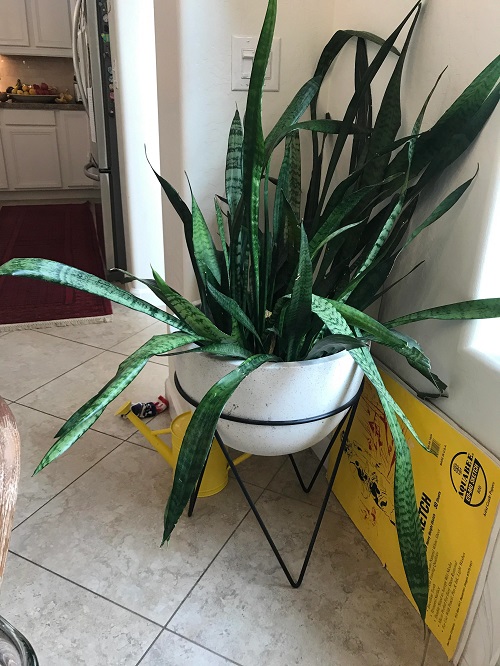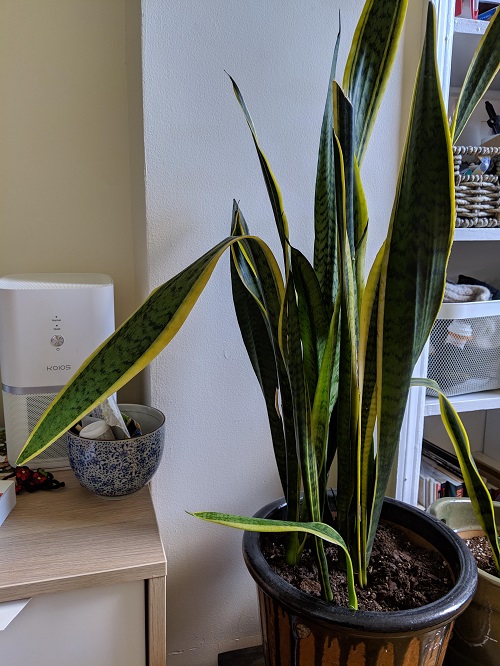Worried about Snake Plant Drooping? Don’t know what to do? This guide will help you with the best tips to revive it.

Snake Plant—renowned for its resilience and almost invincible nature. But what happens when this seemingly indestructible houseplant starts to droop, its once-sturdy leaves sagging in despair? If you’re scratching your head, wondering how a plant known for its hardiness could succumb to such a fate, you’re not alone. In this comprehensive guide, we’re diving deep into the mystery of Snake Plant Drooping, and unravel the reasons behind this.
Growing Cylindrical Snake Plant | Sansevieria Cylindrica Care
Causes of Drooping Leaves

1. Overwatering
- Signs: Soggy soil, yellow leaves
- Solution: Allow soil to dry before the next watering session.
2. Underwatering
- Signs: Dry soil, drooping tips
- Solution: Maintain a regular watering schedule.
3. Temperature Fluctuations
- Signs: General drooping, brown tips
- Solution: Keep the plant in a stable environment, away from air vents and windows.
4. Poor Soil Quality
- Signs: Sluggish growth, discoloration
- Solution: Use well-draining soil and consider adding slow-release fertilizer.
5. Root Rot
- Signs: Dark, mushy roots, foul smell
- Solution: Trim affected roots and repot in fresh soil.
Environmental Factors that Cause Snake Plant Drooping
1. Light Exposure
Inadequate Light
- Problem: Leaves may droop when the plant does not receive enough light.
- Solution: Place your snake plant in a well-lit area with indirect light.
Excessive Light
- Problem: Direct sunlight for prolonged periods can stress the plant, causing leaves to droop.
- Solution: Use sheer curtains to diffuse direct sunlight or relocate the plant to an area with indirect light.
How to Force a Snake Plant to Produce Pups, Learn here
2. Temperature
Low Temperature
- Problem: Cold drafts or sudden temperature drops can cause leaves to droop.
- Solution: Keep the plant in a room with stable, moderate temperatures.
High Temperature
- Problem: Excessive heat can cause drooping and dehydration.
- Solution: Place the plant in a cooler location or provide some form of shading.
3. Humidity Levels
Low Humidity
- Problem: Low moisture levels in the air can result in drooping leaves.
- Solution: Use a humidity tray or room humidifier to increase humidity around the plant.
High Humidity
- Problem: Excessive humidity can lead to root rot, which may cause leaves to droop.
- Solution: Improve ventilation and consider using a dehumidifier.
4. Air Circulation
Poor Ventilation
- Problem: Stagnant air can contribute to fungal growth, affecting overall plant health.
- Solution: Ensure good air circulation by using fans or regularly opening windows.
Best Snake Plant Pot Ideas
5. Water Quality
Chemicals in Water
- Problem: Chlorine or fluoride in tap water can cause the leaves to droop.
- Solution: Use dechlorinated water or allow tap water to sit overnight before watering.
6. Seasonal Changes
- Problem: Seasonal variations in light and temperature can affect the plant.
- Solution: Adjust your care routine according to the season, taking into account changes in light and temperature.
How to Save a Drooping Snake Plant

- Repotting: If the issue is severe, it may be beneficial to repot the plant in new, well-draining soil.
- Leaf Support: You can use small stakes to prop up the drooping leaves until they regain their rigidity.
- Use Aloe Vera Gel: Aloe vera is renowned for its numerous health benefits, and its use in plant care is gaining attention for its potential to improve root health and combat fungal issues. Mix a small amount of aloe vera gel (about 1 tablespoon) with water (1 cup) to create an aloe vera solution. Use a clean cloth to gently wipe the leaves of your snake plant, removing any dust or debris and gently apply the aloe vera solution directly onto the leaves and base of the snake plant. As aloe vera contains salicylic acid, which can act as a natural anti-inflammatory and anti-bacterial agent, potentially helping your plant fight off disease.
- Use Cinnamon Powder: Cinnamon powder is a versatile household item that can also serve as a natural fungicide in plant care. Take a teaspoon and lightly sprinkle cinnamon powder directly onto the soil surface. Make sure to cover the area evenly but avoid excessive application. the drooping appears to be due to a surface fungal infection on the leaves – you can also lightly dust the leaves with cinnamon powder using a cloth or your fingers.
Check out 22 Different Ways to Grow Snake Plants here
What to Do with Drooping Leaves?
If the leaves are severely damaged, it’s best to trim them off to allow the plant to focus its energy on new growth. Mildly affected leaves may recover with proper care. You can, however, use these quick tips as well:
- Use a Stake: Insert a wooden or bamboo stake into the soil next to the drooping leaf. Gently tie the leaf to the stake using a soft string or cloth.
- Elastic Bands: Loop a soft elastic band around the base of multiple leaves, pulling them together for mutual support.
- Hairpins: Use hairpins to hold the leaves upright. Make sure they are rust-free to avoid damaging the plant.
- String Grid: Create a grid of string above the plant, pulling up the drooping leaves through the squares to keep them upright.
- Orientation: Ensure your plant is positioned in a way that allows even light distribution, as uneven light can cause the plant to lean and droop.
- Avoid Drafts: Keep your snake plant away from drafty windows or vents, as sudden temperature changes can weaken the plant.
By taking the right steps and making the necessary adjustments to your plant’s environment, you can rectify the issue of drooping leaves and keep your snake plant healthy and thriving.


